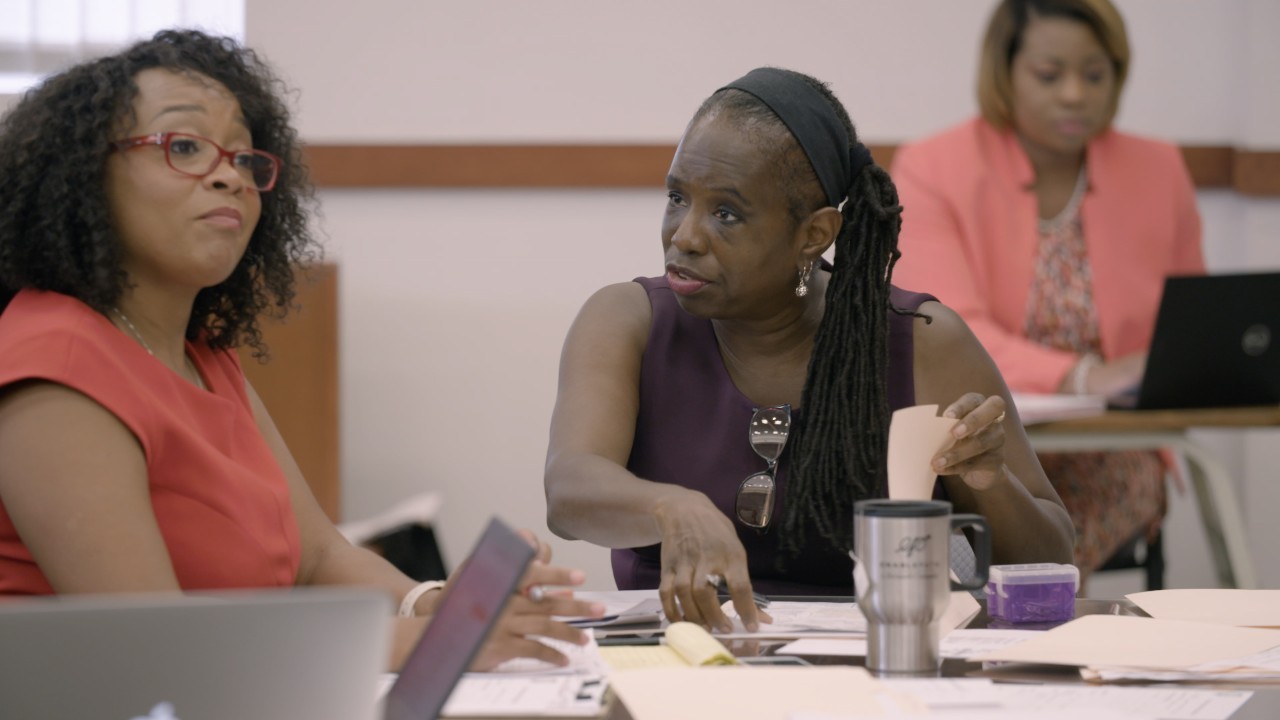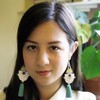Photo by Rachel Eliza Griffiths
By now, you should know about Morgan Parker—she's a tour de force in the world of poetry, author of the collections Other People's Comfort Keeps Me Up at Night and There Are More Beautiful Things Than Beyoncé, and a winner of a Pushcart Prize and a National Endowment for the Arts Literature Fellowship. Her newest work Magical Negro explores themes of black identity in modern American culture, and continued black resilience despite systemic erasure and oppression—the title, of course, references the trope of a black character coming into a film solely to support the development of a white character.Parker did something often considered unthinkable in this day and age, she spoke on the phone—with friend and fellow writer Hanif Abdurraqib. The prodigiously talented music critic, essayist, and poet has authored the essay collection They Can't Kill Us Until They Kill Us, the poetry collection The Crown Ain't Worth Much, and, most recently, Go Ahead in the Rain: Notes to A Tribe Called Quest.Both on tour, they found a spare moment to talk about her latest collection of poems, being gaslit by the world, white people, and the trajectory of their careers. Their conversation has been edited for length and clarity.Hanif Abdurraqib: How do you feel about the reception to your book, Magical Negro?Morgan Parker: Good, good. I was kind of worried after the last book, because it’s different and I knew it would be less fun. It’s harsher. When I turned it in I wondered, “Did I give too much of myself? Did I crack open too much shit?’ But the reception has been great and I feel like there’s some great readings of it. A lot of the organizers tell me, “This is my favorite book that you’ve written.” So that feels good. But there are some times I know that the audience is just going to focus on the dark parts—mostly with white audiences. I get it but it is emotional labor for me to just be talking about that so openly and in depth, every night. And just triggering. Most young, black folks are more sensitive to how intense that is.Abdurraqib: It’s the “now more than ever” thing—this idea of black people being both all knowing but also not worth listening to until things are dire. You really leaned into exposing this ideology of “now more than ever."Parker: What’s annoying about “now more than ever” is that we’ve been saying this shit for a long time and everyone was gaslighting us. It’s extra offensive now when, for all of our lives, people have said, “It’s not really that bad, you’re being too sensitive,” or “slavery was so long ago.” All that bullshit, but now they’re like, “Wow, this is really bad.” No kidding! It’s just too much, the gall to say that to us.

Abdurraqib: At least for me, in my writing, the least interesting thing is speaking to the country now. It doesn’t excite me at all to speak to the known chaos. So many of us have been doing it for so long, and now there are other more interesting things. I actually don’t think your book is that dark at all, I think there’s a lot of humor and affection—both for yourself and your people—in it.Parker: And that is something only some of us will get. White people get really sensitive when you’re talking about them and to them in a harsh way, where they feel like they just need all this extra context and all this extra explanation. But anytime you’re talking about death, you’re also talking about aliveness and how we spend our lives. For me that was more of the focus.Abdurraqib: We read together at AWP, and for days after I told people of that specific reading of the poem “Matt” and how you managed to both engage the audience and challenge the audience in equal measure. It was hilarious to watch that happen, to stand behind you and to see the faces of the people in the audience. I’ve been hearing that poem in many iterations for years. It’s been fascinating and so enjoyable to see how you managed to step into the performance of that poem in many different ways. How do you bring yourself to that?Parker: It’s fun. It was scary when I first wrote it and I actually didn’t publish it for a long time. I was worried. But I think now so many people come up to me, women and men, and just have this really personal response to it. Matt has become this character, that isn’t any Matt that I know but it’s a larger stand in. Black girls will come up to me and say, “this is my Matt, he came.” It’s awesome to know that a poem can be so much fun for me and also very direct to the audience—I’m glad that you guys were there, with me, to look down at the audience, because it’s hilarious. You see people’s faces just like “oh, no.” My goal is to make folks rethink the language they’re using, how they’re being, and just take a closer look at themselves. I think that’s what bothers me the most about contemporary society is that no one really looks at themselves close enough. Otherwise we would be on way better behavior.Abdurraqib: I’m hype about the nature of the folktale, or the folk ethos that shows up in the book, and I was wondering if you could call to life some of your favorite black mythologies and folk tales if you have any.Parker: I’ve been reading a lot of Ishmael Reed because I’m getting ready to do an event with him, thinking about these little phrases, what are these characters, and even the mammy and Br'er Rabbit—it’s interesting when we use stereotypes, these racist iterations of us. The reclaiming of that. Who we call Uncle Tom is interesting to me, versus who they do. I think about naming. A lot of the myth of black America is about giving names to the unspoken stuff that we know. And even thinking about song, that we just know but have never written down, and it gets carried through generations.Abdurraqib: I read in Seattle last night and there were a decent amount of black folks in the room. And I’d mentioned during my reading, I haven’t gotten a haircut in a while because I’m doing a fellowship in a city that is not my city. I don’t even have to finish the sentence—you already know the predicament, right. All the black people in the room groaned and laughed simultaneously. And after the reading three of them came up to me and handed me the card of the barber they knew. There’s something about that too, the known experience, the known black experience that has nothing to do with grief and nothing to do with trauma. Well, I mean, to not get a haircut is a type of trauma.Parker: [Laughing] I have so much trouble in LA even. I honestly believe LA is the capital of hair salons. There are hair salons everywhere. It bothers me because LA has such a big population of black people, and none of these white salons know how to do our hair correctly. Not even after all these years. You haven’t even decided to try to learn. And meanwhile black hair stylists can totally do white hair.Abdurraqib: In some ways it’s about—I mean, this is a very American thing—malleability as a means of survival. Of course black folks in my barber shop know how to cut white hair because if they don’t there’s the risk of them—or the imagined risk—of them not being able to keep the shop open. The white salons, especially in the suburbs, are infrastructurally built to keep gentrified and to keep our folks out. I would imagine they don’t even think about not knowing how to do black hair. So many of us come from households where the hair was done in the household—there was someone, at least in the neighborhood, who could be trusted to do the hair. My brother could cut my hair and if he wasn’t around I knew I could go to a homie’s house to get my hair cut. The hair is kind of sacred, because it was first touched and cared for by people who loved us a great deal. And that’s a trust thing too. Even if some of these white folks knew how to cut black hair perfectly, I’d be like “I don’t know.”Parker: It’s so intimate.Abdurraqib: People always want to ask about “this moment”—not “this political moment” but this “moment of American writing.” Or “how is this happening for you all,” “you all” being this kind of cohort that we have gratefully stumbled into. I am interested or curious as to what you think of “this moment” and what you think your role is in it, and how you see it advancing.Parker: It’s kind of nice to hear people talk about this stuff even though I can’t define it or quite understand it, just because it brings us all together in a way we wouldn’t necessarily do on our own. It started with us all just writing and a lot of us being homies—we’re adjacent to each other, we’re building something way larger that’s in conversation and when read together is really powerful and complex and interesting. There is an encouragement to do your own thing and be confident that it’s supplemented by all the other views, if that makes sense. It is kind of a magic. How cool is that, that people are all of a sudden like “here are these power players.” When I’m thinking, I remember just workshopping these things on someone’s couch, casually. We all have our mini collectives, but it’s not like we’re putting a name on the moment.Abdurraqib: I think the best part is knowing where we began, a few years ago we were just doing readings with people who were showing up for the drinks. I know Danez shared this Twitter thread about how they were looking around at all the people in the room who came up with them, who were not at that point a few years ago. We all move through this moment at the very least in conversation, but for some of us, very actively in tandem. At least for me, this end result—and this isn’t the end result—this large swelling never felt inevitable.Sign up for our newsletter to get the best of VICE delivered to your inbox daily.Follow Nicole Clark on Twitter.
Advertisement
Advertisement

Abdurraqib: At least for me, in my writing, the least interesting thing is speaking to the country now. It doesn’t excite me at all to speak to the known chaos. So many of us have been doing it for so long, and now there are other more interesting things. I actually don’t think your book is that dark at all, I think there’s a lot of humor and affection—both for yourself and your people—in it.Parker: And that is something only some of us will get. White people get really sensitive when you’re talking about them and to them in a harsh way, where they feel like they just need all this extra context and all this extra explanation. But anytime you’re talking about death, you’re also talking about aliveness and how we spend our lives. For me that was more of the focus.
Advertisement
Advertisement
Advertisement
Advertisement
